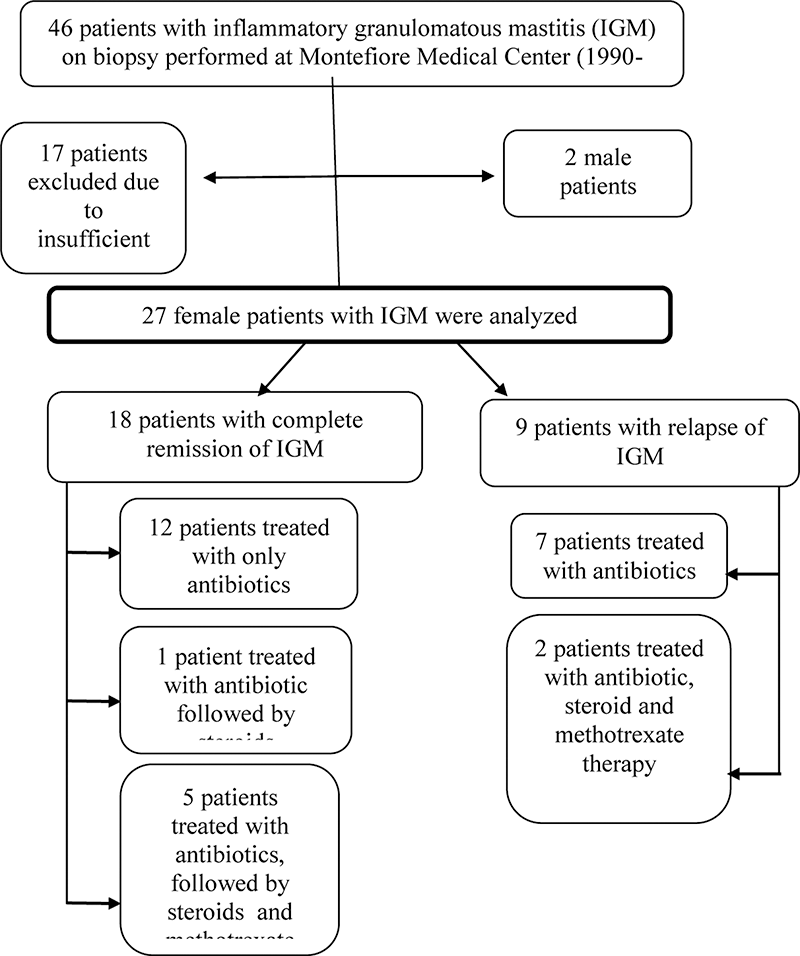

Background: Idiopathic granulomatous mastitis (IGM) is a benign, inflammatory disease of the breast. As per the literature review, etiopathogenesis of this disease is unclear. The gold standard of diagnosis is through breast biopsy and identification of non-caseating granulomas. [1] Until recently, there has been a lack of clinical, serological or histopathological criteria to guide physicians on management of IGM.
Objectives: The objective of our study is to identify distinguishing clinical and laboratory features amongst individuals with IGM based on serologic and histopathologic status. In this study, clinical and laboratory features were compared between patients with complete remission of IGM and those with relapse of IGM after three months of remission.
Methods: After institutional review board (IRB) approval, we queried pathology and clinical looking glass databases at Montefiore Medical Center between 1990-2021 to identify patients with the diagnosis of IGM. We identified 46 patients, and did a retrospective chart review to extract data. Clinical features were compared in patients with IGM who had complete resolution of disease and those who had relapse of disease using two-sample t-tests for continuous variables and chi-squared or Fisher’s exact tests for categorical variables. In this study, we included females older than eighteen years of age. We excluded patients with breast cancer, lymphoproliferative disorders, solid organ malignancy, foreign body reaction in breast, plasma cell mastitis, and ductal ectasia.
Results: Of the 46 symptomatic patients with histopathological diagnosis of IGM, 27 female patients with sufficient clinical data were included in final analyses. All patients in our cohort had a mean age of 36 years (SD 9 years) and average body mass index of 31.5 kg/m 2 (SD 6.7 kg/m 2 ). Majority of patients were Hispanic, 11 patients (40.7%). Unilateral disease (96.3 %) was predominant in patients. Most patients had at least one previous full-term pregnancy prior to diagnosis, 25 patients (92.6%) and 8 patients were on hormonal oral contraceptives (29.6%).
Of the 27 patients, 18 patients (66.6%) had complete remission of disease. All of these patients were initially treated with antibiotic therapies until tissue cultures were reported negative. Six of these patients received steroid therapy after antibiotic therapy, while 5 patients were started on methotrexate therapy, starting with a dose of 15 milligrams (mg) orally once per week. Of the total cohort, 9 patients (33.3%) experienced relapse of the disease.
Conclusion: IGM is a relatively newer entity that is difficult to manage, due to lack of standard guidelines in literature. In this study, on comparing IGM patients with remission and relapse, there were no statistically significant differences in clinical and laboratory features. However, immunomodulating therapy with methotrexate can be considered in patients with relapsing IGM. Further studies are needed to evaluate patients with IGM and their disease evolution that can facilitate management to determine utility of methotrexate in improving relapse rates in these patients.
REFERENCES:
[1]Ringsted, S., & Friedman, M. (2021). A rheumatologic approach to granulomatous mastitis: A case series and review of the literature. International journal of rheumatic diseases , 24 (4), 526–532.
Study Population

Disclosure of Interests: Bhavna Abbi: None declared, Xianhong Xie: None declared, Susan Fineberg Consultant of: expert consultant /expert panel for AXDEV Group in 2021 and Genomic health (now exact Sciences) in 2017, Anjuli Gupta: None declared, Anand Kumthekar: None declared, Bibi Ayesha: None declared